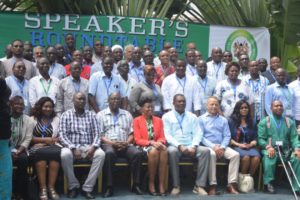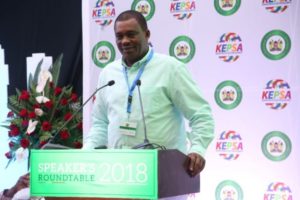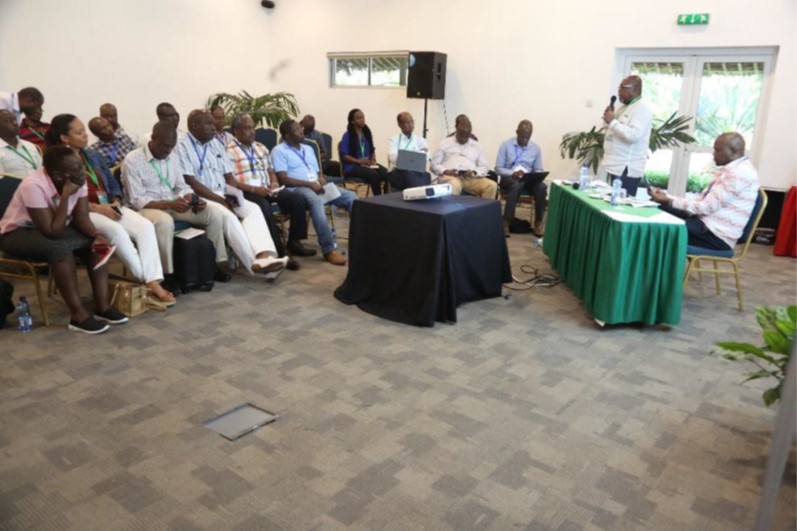The forth Speakers round table
Kenya Private Sector Alliance(KEPSA) held the forth speakers round table meeting at Leisure Lodge, Diani, Ukunda, on the 5th October 2018.The Speaker’s Roundtable (SRT) happened between the National Assembly and the Kenya Private Sector Alliance (KEPSA) and is one of the high level Public – Private Dialogue(PPDs) that was formed and formalized under the 10th Parliament. In her opening remarks, Ms. Carole Kariuki, KEPSA CEO, thanked the speaker and members of the National Assembly for the engagement with the private sector. She noted that KEPSA makes efforts to meet parliamentarians once elected, to enable them understand the private sector and continue engaging through parliamentary departmental committees to provide input into key policies and legislations.
Ms. Kariuki further noted the government’s focus on the Big 4 Agenda and emphasized on the need to work together to achieve the ambitious plan in the shortest time possible. She called for a change in tact and a need to re imagine Kenya through legislative partnership. She added that to spur manufacturing competitiveness, some of the underlying impediments that need to be resolved include; reducing energy costs, curbing proliferation of illicit trade and cheap imports, removal of IDF (Import Declaration Form Levy) and RDF (Railway Development Levy) on industrial input and machinery as well as enhancing prompt payments to suppliers. Through partnership with the National Assembly, she expressed optimism of achievement of the Big 4 Agenda.

The Speakers’ Round Table, under the leadership of the Speaker Hon. Justin Muturi, had some key areas of focus ranging from policy to revenue management to engagement with the private sector engagement. To note a few, the agenda included outlining recommendations and strategy for the conclusion of the list of policies, laws and regulations in the areas of revenue generation, debt management and effective taxation. They also sought to enhance the quality of policy and governance to facilitate a conducive business environment to create jobs and wealth in order to bring inclusive prosperity. Further, the Speakers’ Roundtable aimed to increase uptake and adoption by parliament of key private sector recommendations on the legislative agenda as identified by private sector and to increase coordination between the legislature and private sector on legislative agenda needed to drive the Big Four development agenda and to unlock private sector investments.
The National Assembly Speaker Hon. Justin Muturi applauded the crucial role played by the private sector in the economy as the engine of growth, creating jobs, paying taxes and providing essential goods and services. He said that interactive planning and decision making processes would be needed to support the private sector participation in development and foster partnerships strategies that combine skills, resources and ideas to stimulate the economy, enabling it to respond innovatively to national and global economic changes.

The speaker noted KEPSA’s continued provision of a unified voice for the private sector and maintaining focused efforts to create impact on wealth creation and social economic development. On the other hand, the SRT would provide an opportunity to highlight the key issues affecting public and private relationship and give the National Assembly a chance to identify areas of intervention to create an enabling environment for private sector development and increased investment. It would also act to enhance oversight of the executive to ensure all budgetary proposals are scrutinized and implemented as approved with ensure integrity, ethical values and the rule of law as well as promoting action-based best practices like corporate social responsibility, conservation and protection through prudent use of the country’s natural resources
During the breakout sessions, there were major discussions on universal health coverage (UHC) conducted by Hon. Sabina Chege, the chairperson of the Health Parliamentary Departmental Committee. Kenya Healthcare Federation was represented by Mr. Anthony Jaccodul, Vice Chair of the Health Regulations, Quality and Standards Committee. In his remarks he said that provision of universal health care in Kenya will not only accelerate progress towards vision 2030, but will also lead to realization of Sustainable Development Goal 3 of ensuring healthy lives and promotion of well- being for all the ages. There is therefore need for a whole systems’ approach in the delivery of UHC Mr. Jaccodul also presented KHF’s position statement on which includes; UHC should be implemented and monitored basing on quality indicators that can be measured by accredited Health Standards for Quality, Facilities to adopt both nationally and international accepted patient safety and quality standards e.g. Kenya Quality Model for Health (KQMH), Safecare, Joint Commission International (JCI),The sole government agency handling quality that is KENAS needs to be brought on board to ensure quality of care conversation does not get lost, KENAS would accredit conformity assessment bodies to implement various standards available in the industry, This would also provide a space for continuous quality Improvement, National Hospital Insurance Fund(NHIF)restructuring regulations to various sections of the Health Act 2017 should be drafted and guidelines adopted to ensure this moves in tandem with UHC.
The discussions were rich, informed, and resulted in several recommendations. There is need for a holistic approach to Universal Health Coverage. In addition to financing , we should focus on human capital, better health infrastructure, value chain efficiency, lower cost of medical equipment, standards for health services delivery and enhanced access to quality healthcare, policy on harmonization of pricing of health services to be developed and a review of work schedules in public hospitals to tackle the problem of shortages. There would also be need to evaluate of the Managed Equipment Service Program by the MOH to establish reasons why some of the critical equipment are lying idle and that the NHIF coverage in schools should be standardized to cover all students in both public and private schools including issuance of the NHIF card. The Hospital referral system should be strengthened to the lower tier county run hospitals to reduce burden on Kenyatta National Hospital and Moi Teaching and Referral Hospital. It’s important to strengthen the private sector for curative healthcare while public sector focus on preventive and promote health services. A health summit for all the health leaders including the Health Parliamentary Departmental Committee, Governors, County Executive Members and the private sector was proposed.
The legislative recommended the fast tracking of the Health Laws Amendment Bill 2018 ,by the house business Committee to the committee of the whole house. This bill will promote local manufacturing of pharmaceuticals and medical equipment to tackle influx of illicit trade in Kenya. National Hospital Insurance Fund (NHIF) Bill to be brought to Parliament soonest so as to address governance issues i.e. separate accreditation and financing role of NHIF, Issues of quality management should be assigned to Kenya National Accreditation Service (KENAS) to accredit healthcare facilities and Ministry of Health MOH to oversight policy, Ministry of Health to fully operationalize the Health Act, Review Insurance Regulatory Act to increase uptake of private insurance in addition to the National Hospital Insurance Fund (NHIF) and Finance Committee to review the public finance management Act to ensure that health finances are ring-fenced exclusively for health services only and avert diversion.
